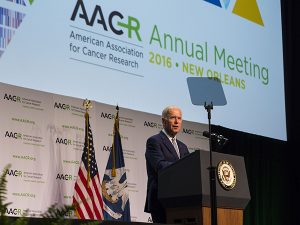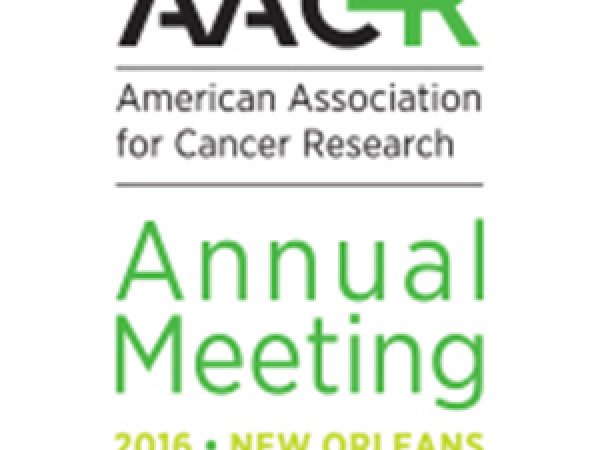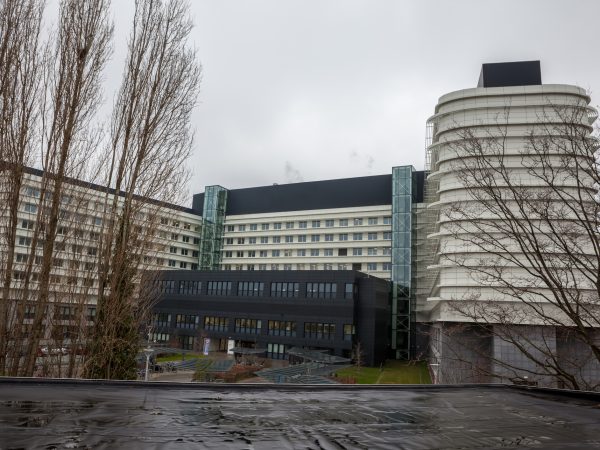Key Policy Sessions Set for AACR Annual Meeting 2017
In an extraordinary year in the nation’s capital, the American Association for Cancer Research is anticipating an extraordinary meeting.
In addition to the robust scientific program at this year’s AACR Annual Meeting in Washington, D.C., a number of sessions will provide a policy perspective on the meeting’s theme, “Research Propelling Cancer Prevention and Cures.” The AACR is also bringing its message to Capitol Hill during a special Congressional briefing on Tuesday, April 4, at noon ET in Room 268 of the U.S. Capitol Visitor Center.
Coinciding with the briefing, the AACR has launched a massive social media Thunderclap campaign, where anyone in the U.S. can sign up, using Twitter, Facebook, and/or Tumblr to help call on Congress to provide critical funding increases for the National Institutes of Health.
Our colleagues in the AACR’s Office of Science Policy and Government Affairs are responsible for planning the policy program at the Annual Meeting. In the Q&A below, they shared more about the sessions.
Can you describe the two types of policy sessions featured at the Annual Meeting?
The Regulatory Science and Policy track provides attendees with an opportunity to interact with the U.S. Food and Drug Administration (FDA), National Cancer Institute, industry, and many in academia, including basic researchers and physician-scientists. These informative sessions are designed to highlight recent regulatory developments and provide an open forum for the discussion of cutting-edge issues in cancer drug, biologic, and diagnostic regulation.
The Science Policy track provides attendees with the opportunity to learn more about health and science policy issues affecting cancer research, patients, survivors, and families. The sessions are designed to highlight recent developments in science policy as it affects cancer research and provide an open forum for the discussion of health care policies that impact cancer patients and families.
What can attendees expect from the policy sessions at this year’s Annual Meeting? Are there specific sessions you’d like to highlight?

Vice President Joe Biden speaks during the closing plenary session at the AACR Annual Meeting on Wednesday April 20, 2016. He will also speak at this year’s Annual Meeting at a session on the Beau Biden Cancer Moonshot. Photo by © AACR/Todd Buchanan 2016
A special session, “Beau Biden Cancer Moonshot: Progress and Promise,” takes place on Monday, April 3, at 1 p.m. (Plenary Hall D/E, Convention Center). This session provides an opportunity for leaders from government, academia, industry, and patient advocacy organizations to discuss how the “Beau Biden Cancer Moonshot” provision that was included in the 21st Century Cures Act is stimulating the acceleration of progress against cancer and how it will result in better outcomes for patients. Former Vice President Joe Biden will deliver remarks at the beginning of the session, which will be followed by a panel discussion moderated by AACR President Dr. Nancy Davidson. The panel will feature Elaine Chao, Secretary of Transportation; Fran Drescher, actress and founder of Cancer Schmancer; Dr. Richard Pazdur, director, FDA Oncology Center of Excellence; Dr. Douglas Lowy, acting director, NCI; Dr. Michael Caligiuri, AACR President-Elect; and Dr. Elizabeth Jaffee, the AACR’s incoming President-Elect, who served as co-chair of the Cancer Moonshot Blue Ribbon Panel.
Among the nine exciting Regulatory Science and Policy track sessions this year, Pazdur will moderate “Tables Turned: A Conversation with the Press About the Future of Cancer Research and Treatment” on Sunday, April 2, at 1 p.m. (Room 143, Convention Center). Prominent journalists covering science and cancer will sit down with Pazdur to provide insight into how the news media report on opportunities and challenges that exist today for advancing cancer research and developing cancer treatments. Press panelists will include Adam Feuerstein from The Street, Matthew Herper from Forbes, Laurie McGinley from The Washington Post, and Meg Tirrell from CNBC. The session will likely explore the public’s perceptions of a wide range of topics, including cancer research and innovative cancer treatments; the kinds of stories and issues that are deserving of “front page” news; and the cancer moonshot initiative.
Back by popular demand, Dr. Amy McKee, deputy director of the Office of Hematology and Oncology Products at FDA, will chair “New Drugs – A Review of Recently Approved Breakthrough Therapies” on Tuesday, April 4, at 3 p.m. in Room 143. The FDA may designate a medical product as a Breakthrough Therapy if the therapy treats a serious or life-threatening disease or condition and preliminary clinical evidence indicates that the drug may demonstrate substantial improvement over existing therapies. This session will pair FDA reviewers with leading academic researchers to explore the impact of accelerated drug access on patient treatment.
Who would you encourage to attend the policy sessions?
We encourage all attendees to participate in these sessions, from students and early-career scientists interested in how NIH funding can impact their future to industry specialists looking to learn more about regulatory science and the latest advancements in cancer treatments and clinical trial protocols.
How do the policy sessions and scientific sessions at the Annual Meeting complement each other?
All policy sessions are directly informed by and rely on basic and clinical science. There are two ways that science and policy interact, including at the Annual Meeting: science for policy and policy for science. Regulatory Science and Policy sessions, for example, are science for policy sessions that present the latest science and research affecting drug development, from clinical trials to FDA approvals and beyond.
Last year, Vice President Biden’s speech added a strong dose of policy to a meeting that is often heavily focused on science. Now that the venue is Washington, D.C., what sort of balance between science and policy, and what sort of tone, do you anticipate?
From funding research grants to minimizing the barriers to clinical trials, the decisions made in Washington, D.C., directly impact the science presented at the Annual Meeting and influence the rate of progress against cancer. Policy is also directly related to the theme of the Annual Meeting, “Research Propelling Cancer Prevention and Cures.” These times require that cancer researchers become more actively involved in and better informed about the policymaking process as it impacts cancer research, patients, survivors, and families.
We are in an unprecedented era of scientific discovery that holds enormous promise for new advances in cancer treatment and prevention that could save lives around the world. Failure to capitalize upon these scientific opportunities is simply not an option. Now is the time for policymakers to prioritize and invest in lifesaving cancer research.
Can you describe how the policy sessions support the overall mission of the AACR?
 The policy sessions at the Annual Meeting are directly influenced by and aim to further the AACR mission: to prevent and cure cancer through research, education, communication, and collaboration. The Science Policy track along with special events such as the Beau Biden Cancer Moonshot session and the Congressional briefing on Capitol Hill seek to communicate with and educate policymakers about the latest in cancer research in order for them to become active champions in our efforts to better prevent, detect, and cure the hundreds of diseases we call cancer. The Regulatory Science and Policy track provides a venue for communication about the influence of cutting-edge cancer research on regulation between multiple stakeholders from government, industry, academia, and the nonprofit sector, and promotes future collaborations between those stakeholders to explore these critical topics.
The policy sessions at the Annual Meeting are directly influenced by and aim to further the AACR mission: to prevent and cure cancer through research, education, communication, and collaboration. The Science Policy track along with special events such as the Beau Biden Cancer Moonshot session and the Congressional briefing on Capitol Hill seek to communicate with and educate policymakers about the latest in cancer research in order for them to become active champions in our efforts to better prevent, detect, and cure the hundreds of diseases we call cancer. The Regulatory Science and Policy track provides a venue for communication about the influence of cutting-edge cancer research on regulation between multiple stakeholders from government, industry, academia, and the nonprofit sector, and promotes future collaborations between those stakeholders to explore these critical topics.
What is the most interesting part of preparing for the Annual Meeting?
It has been great to witness the enthusiasm and passion of our session chairs and presenters for furthering progress against cancer. The chairs and invited speakers for the policy sessions at the Annual Meeting are among the top in their field, in both government and research, and being able to work with them and provide them with the platform to share their immense knowledge has been both an honor and a pleasure.
Is there anything else you would like to tell Annual Meeting attendees?
Accelerating progress against cancer will require that Congress and the administration make biomedical research a national priority. To make that happen, we have worked to provide attendees with the tools and resources necessary to empower them to share their voice and knowledge with policymakers.
This will be among the largest gatherings of cancer scientists at our nation’s capital, and policymakers will be watching and listening. We remain committed to working with scientists, policymakers, and all stakeholders to ensure that the promise of cancer research is translated into lifesaving advances for patients around the world.



